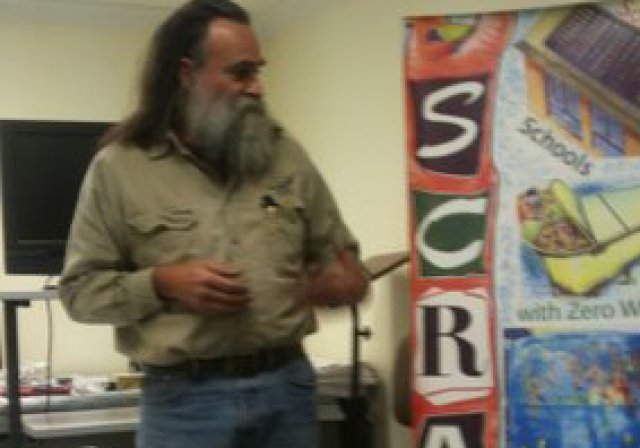
Supporters of the Addison Road Centre in Marrickville met on July 15 to discuss a plan to sustainably deal with the centre’s waste and turn ARC into a leader in environmental sustainability.
The centre was built in 1914 as an army barracks. The NSW Lands Department handed it over to the community in the late 1970s after a long struggle. For 30 years, ARC has provided a large community space in inner-western Sydney.
A law preventing local councils from providing waste services to non-ratepayers has meant ARC faces a huge cost for waste removal.
The July 15 forum decided this challenge was an opportunity to plan waste reduction and develop systems to keep waste on-site, such as composting to grow food at the centre.
Discussion was led by Marrickville resident Bernie Hobbs from ABC TV’s New Inventors and Catalyst, and ABC radio.
ARC president John Reynolds outlined for the meeting the high cost of waste removal — running into tens of thousands of dollars — and the need to involve the centre’s residents and community supporters in exploring options and implementing solutions.
The meeting heard from Michael Mobbs, who developed a sustainable house in Chippendale, Sydney. For 14 years, no water or sewerage has left the site. The house generates all its electricity — it even generates income by returning excess power to the grid system.
“In nature, 80% of water stays where it falls”, Mobbs said. “We have to emulate nature, so that our buildings keep 80% of the water that falls there, and recycle and reuse it. Recycling waste food and green waste can provide all the compost needed, without the use of chemical fertilisers, to grow food in the street.”
In Chippendale, inner-Sydney, community composting means tonnes of waste becomes soil that is helping to grow 50 fruit trees and hundreds of productive plants in street gardens accessible to all.
Mobbs pointed out that ARC could lead the way in environmental sustainability and involve the community beyond the centre, who could bring their waste to be processed at ARC and combine composting with an urban farming project.
Peter Carroll from SCRAP (School Communities Recycling All Paper) also spoke. He said industries should be made to take responsibility for products they produce from cradle to grave, through the whole life of the product.
Following the strong support from the meeting, a strategy will now be designed to help ARC keep and process all its waste on site. Waste is only the first step: ARC is also looking at energy, sewage, water recycling and other issues.
[To help ARC in its shift to environmental sustainability, visit www.addisonroadcentre.com.au.]